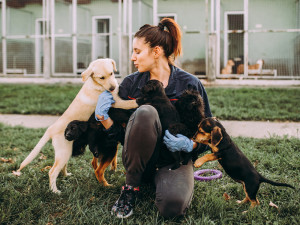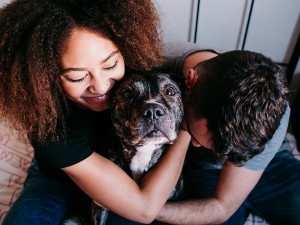10 Questions to Ask a Shelter About an Adoptable Dog
From exercise needs to medical history to compatibility with kids, here is everything you need to know.

Share Article
You’ve checked out a lot of online profiles and you’re finally ready to swipe right. Your perfect match is short, with unkempt hair and a snaggletooth — exactly what you’ve been looking for in a four-legged companion. But there are still some things you need to know before you bring them home. Before filling out an adoption application to make it official, ask these 10 questions about an adoptable dog.
1. How did the dog end up in the shelter?
Dogs are surrendered to shelters and rescues for a range of reasons, from owners moving or struggling with finances to pet illnesses or behavioral issues. Learning about their history can provide important clues about whether you can meet their needs, according to Caitlin Phillips, people and operations manager at Animal Rescue League of Boston.
“If your daily routine is drastically different than the dog is used to, you may have a longer adjustment period while they learn new things,” Phillips says. “If the dog’s backstory is similar to the situation and family you will provide…they may adjust quickly to your family.”
2. How old is the dog?
There is no perfect age to adopt a dog. While puppies, adults, and senior dogs all make wonderful pets, knowing the age of an adoptable dog can help you better understand their potential training, behavioral, and health needs. Puppies will need a lot of teething toys to satisfy their urge to chew, while adult dogs have outgrown the “chew all the shoes” stage; senior dogs may need more medical care to keep them healthy into their golden years.
3. What breed mix is the dog?
Shelters and rescues are filled with dogs from all backgrounds, from pedigreed purebred dogs to mutts of unknown origin. Phillips suggests asking about the breed or mix of breeds of the dog you want to adopt. “A dog’s breed can give you an idea of what types of behavioral or medical concerns you might see over time,” she explains. Once you have information about the dog’s breed, do some research to determine whether their temperament, exercise, and grooming needs fit with your lifestyle.
4. Has the dog been vaccinated and spayed or neutered?
Not only does spaying and neutering eliminate unwanted litters, it can also impact health and behavior. “Owning an intact dog may lead to unwanted marking or territorial behaviors,” Phillips says. “Intact dogs can also have a higher incidence of reproductive cancers.” Many shelters and rescues only adopt altered animals, but some provide vouchers or referrals to low-cost spay/neuter clinics so adopters can have their new (intact) dogs altered.
5. Does the dog have any known health conditions?
All dogs require nutritious food; monthly flea, tick, and heartworm preventives; and routine vet care, but health conditions ranging from diabetes and arthritis to hip dysplasia and blindness may require extra TLC. While many shelter dogs are in perfect health, Phillips still suggests asking about any known health issues, adding, “It can help you realistically determine if you can afford future medical care and if the care that will be needed for that dog is something you can commit to.”
6. How much exercise does this dog need?
If your lifestyle is more Netflix and chill than weekend warrior, you probably shouldn’t adopt a Dalmatian, Jack Russell Terrier, Labrador Retriever, or other breeds that require a long run and epic games of fetch to burn off their boundless energy. Similarly, if you want to spend weekends exploring local hiking trails, skip dogs like Basset Hounds, Shih Tzus, and Pugs who would rather nap than run and play.
7. Does the dog have any formal training?
All dogs can learn new tricks, but knowing whether your new family member knows any commands — and whether they respond to verbal commands or hand signals — can help you “speak their language,” says Phillips. “This could help give you a good foundation to bond with your dog early on in your relationship,” she adds.
8. Is the dog good with other animals? What about children?
It’s important to ask this question even if you don’t have any children or animals in the house. “This is good information to know for all of the inevitable [times] in life when you pass other animals on the street or when the neighbor’s children walk up to your fence,” Phillips says. It’s also good information in case you want to add to your family in the future — and knowing now can help you prepare with training to ensure your new friend is on their best behavior in all situations.
9. Is the dog crate trained?
Crate training helps with everything from housebreaking to anxiety. Phillips also recommends it as a general safety measure, especially when your dog is in a new environment. Some adoptable dogs were introduced to crate training in their previous home or their foster home and continuing the practice in your home can help them adjust. Don’t dismiss an adoptable dog that isn’t crate trained. Instead, prioritize crate training until it’s their go-to chill spot.
10. Is there a dog we should consider?
No one knows the animals in their care better than shelter and rescue staff. Talk to them about your lifestyle and the qualities you want a new best friend and see if they can make a love connection. You might end up falling in love with an underdog.

Jodi Helmer
Jodi Helmer is a North Carolina-based freelance writer who shares her home with an embarrassing number of rescue dogs and relies on four feral cats to patrol the barn. When she isn’t refilling food and water dishes, Jodi writes about animals for Scientific American, Sierra, WebMD, AKC Family Dog, Living the Country Life, and Out Here.
Related articles
![Woman holding dogs at an animal shelter]()
10 Ways Animal Shelters Are Upping Their Game
New trends we can totally get behind.
![Couple hugs their merle Boxer]()
How to Improve Your Relationship with Your Dog
Animal behaviorist Dr. Karen B. London on how to strengthen your pet-parent bond.
![anonymous woman pampering and taking care about a small ginger kitten]()
6 Ways to Help Local Shelters Without Committing to Full-Time Pet Parenthood
Learn how you can be there for animals in need this National Pet Day.
![Girl sitting on couch hugging her playful dog with the window open to outside]()
7 Myths About Rescue Animals—Debunked
For starters: No, they’re not all traumatized and yes, you can find a purebred puppy at a shelter.




